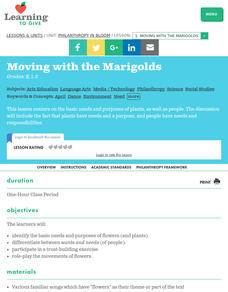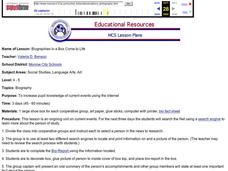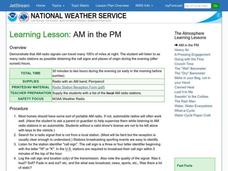Curated OER
Matisse Cut-outs
Students explain color and composition from an arrangement of color paper cut-outs without a definitive sketch or drawing.
Curated OER
Moving with the Marigolds
Students identify the basic needs and purposes of flowers. They differentiate between wants and needs of people. They participate in trust building exercises. They role play the movements of flowers.
Curated OER
Lifting Fingerprints
Students examine the uniqueness of each other's fingerprints through the dusting and lifting of them. They use stamp pads, powder, brushes, etc. to collect as many different prints as they can.
Curated OER
Predicting the Greening of Spring With Red Emperor Tulips
Students examine seasonal changes by watching tulip plant growth across the continent utilizing the Journey North website. They develop hypotheses as to why the plants emerge and grow where they do.
Curated OER
Age of Exploration
Students work individually or in a group researching a box compass using historical information on the uses of the compass as well as the scientific theories of the compass. They create a box compass and a water compass which are...
Curated OER
Chinese Newspapers
Students investigate the role of Chinese newspapers in the Australian Chinese community, both in the early 20th century and today. They identify the role of ethnic newspapers.
Curated OER
Ecology - Ecosystem
Third graders research ecosystems, the work of ecologists, John Muir's contribution to the environment and an endangered species of their choice. They read books, participate in discussions, and write reports.
Curated OER
First Grade American Civilization: February
First graders examine and discuss the Boston Tea Party, Paul Revere, Redcoats, Thomas Jefferson and the Declaration of Independence. They conduct an experiment done by Benjamin Franklin, solve a word puzzle written in code by Ben...
Curated OER
Eating for Two
Fourth graders keep a food diary and prepare a Healthy Meals Chart regarding foods they eat while pregnant.
Curated OER
Our Class Record Book
Second graders, in groups, prepare a list of proposed record ideas for the class book.
Curated OER
Fabulously Famous ABC'S
Sixth graders write a script for an imaginary two-minute radio interview with a famous (past/present) talk show host. .Working in groups of two or more, 6th graders practice their interview with another.
Curated OER
Election 2000
Learners review the 2000 presidential election. Students write an expository essay in response to the following: Should the election process in the United states be changed?
Curated OER
Biographies in a Box Come to Life
Students use the Internet to research someone's biography.
Curated OER
Election-Year Issues: Where Do the Political Candidates Stand?
Students create a multimedia presentation to compare the platforms of political candidates using information gathered from their research.
Curated OER
ExplorA-Pond:3rd Grade Probability
Third graders cut a map of a pond into grid squares. They count the total number of squares and calculate the probability of drawing a pond piece vs. a shoreline piece. They draw 10 pieces and compare the results with the original...
Curated OER
To Arms!: Recruitment of Civil War Officers
Young scholars read and compare two Civil War recruitment advertisements from different years in the war. They decide how people's feelings about the war may have changed over the years by examining the tone of the advertisements.
Curated OER
Bioethics of Stem Cells
Young scholars complete a variety of activities as they examine the ethics behind stem cell research and use.
Curated OER
Siege and Battle of Corinth
Students complete a variety of activities that go along with the study of and possible fieldtrip to thesite of the Siege and Battle of Corinth in Mississippi. They examine the role transportation routes played in the formation of their...
Curated OER
Learning Lesson: AM in the PM
Students discover how AM radio signals can travel at night. They listen for a radio station not in their immediate area and log the call sign and the location of the station. They discuss the difference in transmissions during the night...
Curated OER
Picture Frame
Students create their own picture frame. They use cardboard and macaroni for the frame. They put in the frame any picture they like from the class. They also make a stand for the frame.
Curated OER
Create a Compass Instructions for Teachers
Students, who are teachers, discover how to make box and water compass in their classrooms. They describe the scientific principles that are involved in making and using a compass.
Curated OER
Patterns, Relations, and Functions: Lesson 3: Numerical Patterns
Fourth graders extend and continue numerical patterns using function or input/output machines. They finish the increasing patterns using input/output tables, and generalize the rules that apply to the pattern. They complete the...
Curated OER
A Jazz Talk Show
Students analyze and describe music while connecting it to history and culture. They gain experience in theatre arts skills and writing. They use the Internet to do research in order to find out the most about this subject.
Curated OER
Geometric Figures
Students identify two and three dimensional shapes and use appropriate geometric vocabulary to write a description of the figure by taking pictures of geometric figures in their own environment.

























